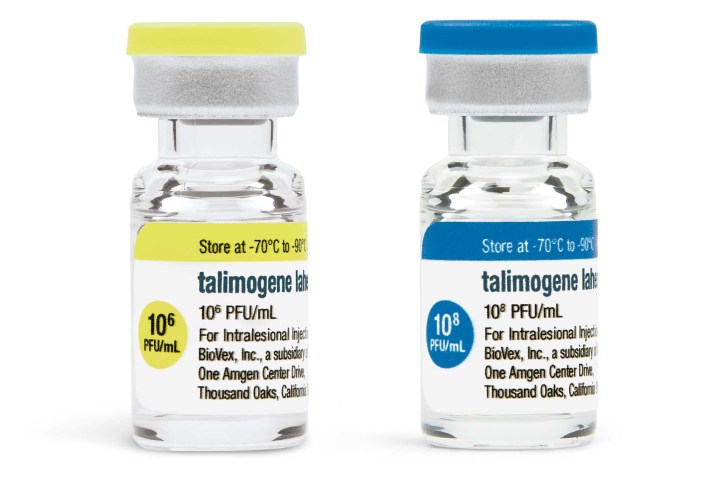
Imlygic is an oncolytic (cancer-killing) drug that uses the cold sore-causing herpes virus as its base. The virus was genetically engineered to attack the rapidly-dividing cancer cells while ignoring the slow-growing healthy cells. Once the drug enters a cell, it takes over the host’s DNA replication system and begins to make copies of itself. These copies multiple quickly, causing the cancer cell to burst.
Amgen also removed a gene from the virus that allows it to evade detection by the host. The now very visible virus will stimulate an immune response when it begins attacking cancer cells, causing them to explode. Researchers also added a gene for the production of the GM-CSF protein, which is another immune system stimulant. As a result of this combination, the immune system goes into overdrive, joining the Imlygic in effectively mounting an attack against the cancer causing cells.
Unlike chemotherapy treatments that require oral dosages, doctors inject the Imlygic drug directly into the tumor, destroying the cells in a targeted attack. Clinical trials showed that Imlygic was able to shrink a tumor significantly more than control patients who only received the GM-CSF protein therapy. Imlygic shows promise, but it may not be a cure-all — even though it reduced the size of the tumor in trials, patient mortality was not reduced with the drug.
Imlygic now is only being used to treat melanoma –a deadly form of skin cancer– and other solid tumor cancers. “T-Vec represents an important milestone in using viruses as the vehicle to stimulate immune response and fight cancer,” said Tim Turnham, executive director of the Melanoma Research Foundation. Amgen will begin offering Imlygic to patients in the coming weeks with an average cost of $65,000. The company also is continuing to study the treatment in combination with other immunotherapies to see if it can improve cancer survival rates.



